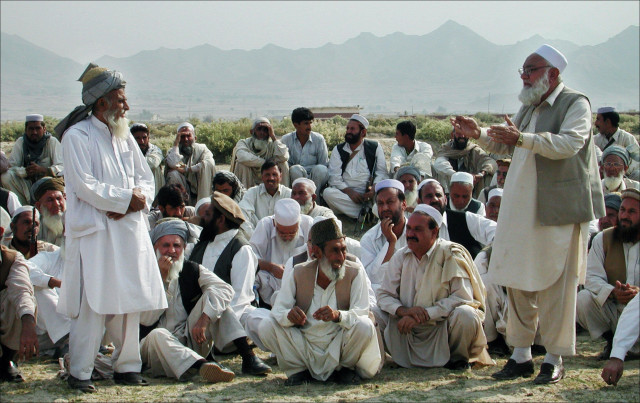Showing resentment: North Waziristan tribesmen denounce restrictions
Say it is for them to decide if they want to vaccinate their children against polio.

Say it is for them to decide if they want to vaccinate their children against polio. PHOTO: AFP/FILE
Scores of tribesmen from North Waziristan protested in front of the Miranshah Press Club after the political administration did not verify their travel documents and identity cards.
On December 17, 2012, the political administration halted all the incentives for the Wazir and Dawar tribes in the agency after they refused to vaccinate their children against polio.
Earlier on June 15, senior Taliban commander Hafiz Gul Bahadur issued a decree which banned anti-polio drives in the agency unless drone attacks were stopped. According to the decree, anyone who did not obey the orders would be held “responsible.”
Upon the directives of the political agent, no passports, national identity cards or employment and development projects will be processed unless the tribesmen vaccinate their children.
One of the protestors, Allah Nur Wazir, a resident of Hamzoni village, said he had been visiting the administration’s office since a week to get his no-objection certificate (NOC) and signed passport to go to Saudi Arabia.
He added that his visa expired on Friday and he had taken a loan of Rs0.1million from his relatives, who he promised to pay back when he reached Saudi Arabia. “My visa has expired, how will I be able to pay the loan back?” Wazir questioned.
Muhammad Ishaq Khan, from Miramshah village, said that he had borrowed Rs0.35 million to finance a labour visa for Dubai. His agent had told him to get his papers completed by January 10, but administration officials refused to sign his passport and now he is penniless, Khan lamented.
“I don’t understand the logic behind stopping incentives over refusal of polio vaccinations. It is up to us if we want to vaccinate our children or not. Do we ever ask the government for treatment when our children are crippled?” urged Ishaq.

Hazrat Ali, a resident of Datta Khel, said that during multiple visits to Miranshah for his national identitiy card (NIC), he was stopped at every check post by security forces who asked for identification. “I had to tell them every time that I’m heading to the political office to get my NIC, and then they would let me go.”
Political administration officer Muhammad Tahir said that they were aware of the problems faced by tribesmen. “We have received orders from the Fata Secretariat not to sign a single document unless the tribesmen vaccinate their children against polio.”
Talking about the impact of the Frontier Crimes Regulation (FCR), Fata Lawyers Forum President Ijaz Mohmand said the ‘draconian’ law was devised by British rulers to integrate the Northwest tribal areas with their empire.
“It wasn’t a one sided law. It also benefited tribesmen as the law was formed under an agreement between them and the British,” he added.
He, however, said the tribesmen have no rights to appeal against the decision of a political administration under the FCR. “There is a collective responsibility clause holding a whole tribe responsible for any criminal activity in their area.”
He explained the political agent enjoys executive and judicial powers and no regulatory mechanism is in place to check its misuse, which results in serious human rights violations.
Ijaz admitted it is very difficult to find an alternate law, but added the government can amend the FCR.
Published in The Express Tribune, January 13th, 2013.













COMMENTS
Comments are moderated and generally will be posted if they are on-topic and not abusive.
For more information, please see our Comments FAQ